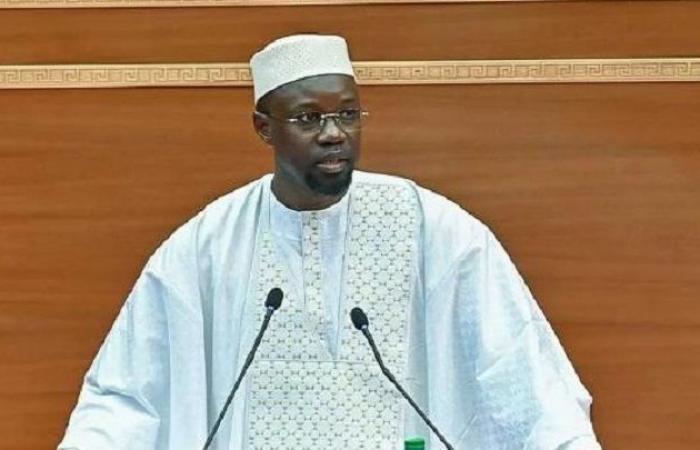A major event in Senegalese political history is taking place both before our eyes and, according to the press headlines of this Saturday, December 28, 2024, in a completely silent manner. Prime Minister Ousmane Sonko has decided to hold his government accountable for the vote on the 2025 finance law.
The President of the National Assembly has in fact published, in the wake of the DPG, a summons of deputies this Saturday, with the following order:
- 10:00 a.m.: examination of the finance bill for the year 2025, in accordance with the provisions of article 86, paragraph 6, of the Constitution
- 12:00 p.m.: election of members of the High Court of Justice
We can bet that what will have attracted most attention on this agenda is the second point, which is however nothing exceptional but which concerns strong public expectations. This is quite practical, because it allows us to relegate to the background this major fact which is the invocation of article 86.6 which is nothing other than a copy/paste of the famous French 49.3.
This provision of the Constitution allows a law to be passed without a vote and therefore without debate. Its invocation by the Prime Minister can be followed by the filing of a motion of censure, within 24 hours, which, if passed, causes the fall of his government. If this reminds you of anything, then you certainly followed the adventures of the short-lived Barnier government in France, in a completely different context. What looks very much like a diversionary maneuver worked so well that in the written press of the day, it is impossible to find a single headline on this unprecedented historic event in our country.
Even if MP Aissata Sall had drawn attention to the possibility of the use of this device and the rumor had been growing for several weeks, we must fall back on the online press to finally see the subject covered, what’s more , by a specialist: Professor Meissa Diakhate, Professor of Law and founder of the CERACLE (Center for Research, Expertise and Training on Constitutional Institutions, Public Administrations, Financial Governance and Legistics in Africa).
In an article published late Friday night on seneplus, entitled The Prime Minister and the Constitutional Exploit, Professor Diakhate, who evokes the historic nature of this act carried out by the Prime Minister, in very laudatory terms, is very pleased precisely the opportunity offered to him to be able to give his students a practical case of invoking a “dormant” device of the Constitution. The professor’s satisfaction is entirely understandable from this point of view and could be compared to that of a professor of medicine, having the opportunity to present to his students a patient suffering from a rare disease that they have studied. in class.
Beyond this legitimate satisfaction of the practitioner, this contribution from Professor Diakhate nevertheless poses a problem, in the sense that he seems to provide academic support for what, from my point of view, is more of a political maneuver, one more of the part of an indisputable strategist in the matter, whose immediate effect is to avoid a substantive parliamentary debate on a finance bill designed and adopted in conditions, to say the least, unorthodox.
First of all, I would like to modestly point out that not being a lawyer, CERACLE is my main source of information on legal issues and, from this point of view, I consider Mr. Diakhaté, in a certain way, like my teacher. In addition, he did me the honor of publishing one of my articles on the website and social networks of his research center. This shows my discomfort in this contradictory exercise, but it is also the beauty of the debate of ideas that our country can pride itself on.
Article 86 paragraph 6 states that “ The Prime Minister may, after deliberation by the Council of Ministers, hold the Government accountable before the National Assembly for the vote on a finance bill. In this case, this project is considered adopted, unless a motion of censure, filed within the following twenty-four hours, is voted on under the conditions provided for in the preceding paragraph. ».
On the constitutionality of the use of this device, M Diakhate indicates that the act “does not suffer from any gray areas” and assures the Prime Minister that he has “the Constitution with him”, specifying, as if to ward off a possible challenge to the regularity of the procedure, that “The text deliberated in the Council of Ministers concerns “a finance bill””. A Council of Ministers had indeed adopted the finance bill for the year 2025, on December 3, 2024, but there had not been explicitly mentioned the use of article 86 paragraph 6. Which makes the student somewhat confusing and deserves at least an expert debate to shed some light on the subject.
As for the advisability, in substance, of such a decision, namely that of passing a law into force by a government which nevertheless has a large majority in the National Assembly, the question of the deadline of 31 December, the end of the financial year, is obviously the one that would come to mind. The bill having been adopted by the Council of Ministers on December 3, 2024, this gives very little time for a budgetary marathon, especially when we have dragged out the preparation, adoption and transmission to the Assembly of the finance law concerned.
Some have even reported a violation of the LOLF which consisted of adopting the finance bill in the Council of Ministers, after the opening of the ordinary session of Parliament, when it was to be transmitted to the Assembly at later on the opening day of the session. Moreover, this argument of the deadline is all the more debatable since between the adoption of the bill in the Council of Ministers and the end of the year, we had one month to debate and vote on it. without resorting to the nuclear option of 49.3 – sorry, 86.6 – but, as we have seen, the priority of the National Assembly the day after its installation was elsewhere than on the budget.
In any case, if we really wanted to take the time to examine and vote on this finance law within the framework of a normal budgetary debate, taking into account the exceptional situation resulting from the dissolution, that would be entirely appropriate. possible and it is provided for by the texts. France, which is our reference in this area, we remind you, is exactly in this situation today. Just like the French President, President Diomaye Faye has legal tools which allow him to collect budgetary resources and execute expenditures to ensure the continuity of the regular functioning of the State, until the vote of the next budget, which could occur after December 31. But this finance law poses a lot of problems to which we will return, and it is very practical for the government not to dwell on it too much and to quickly move on to something else.
Arona Oumar KANE
Software Engineer
Bangath Systems – Dakar
Email: [email protected]
WhatsApp: +221 77 588 64 26






